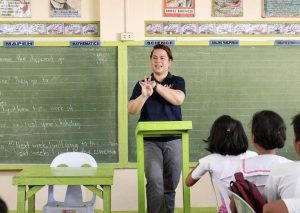Philippine Vice President Sara Duterte on Friday announced her “irrevocable resignation” from the country’s ruling party due to “political toxicity,” adding to the intrigue that has surrounded the country’s ruling party since a minor shake-up in Congress last week. The announcement came in a statement released Friday, in which the vice president, the daughter of the last president, Rodrigo Duterte, said that she would leave the Lakas-CMD party, “effective today.”
“I am here today because of the trust of the Filipino people in me to lead and serve them and the country, and this cannot be poisoned by political toxicity or undermined by execrable political powerplay,” Duterte said in a statement without elaborating, Nikkei Asia reported.
Duterte thanked party members for their support, but said politics would not distract her from doing her job. “Nothing is more important to me than being able to meaningfully serve our fellow Filipinos and the Philippines – with President Ferdinand Marcos Jr. leading the way,” she wrote. “Trust that my word, my commitment will be immutable.”
Duterte’s comments hinted at brewing instability within the Lakas-CMD party, which holds the largest number of seats – 71 out of 316 – in the fragmented Philippine Congress, ahead of mid-term elections in May 2025.
The references to “political toxicity” and political power plays were seemingly references to the events that unfolded in the House of Representatives last week, when the House leadership demoted former President Gloria Macapagal-Arroyo, the grey eminence of Lakas-CMD, from her honorary position of senior deputy house speaker to one of the chamber’s nine deputy speakers. House Majority Leader Mannix Dalipe said the demotion sought to relieve Arroyo of the “heavy load” that comes with the title, even though the “senior” title carries no additional duties.
Her removal was accompanied by rumors that she had been plotting to swipe the chamber’s top post from her mentee, House Speaker Martin Romualdez, something that she was later forced to deny. Romualdez, a cousin of President Ferdinand Marcos Jr., is the chairman of Lakas-CMD.
Duterte and Arroyo, two of the most powerful women in Philippine politics, are known to be close allies, and Duterte’s resignation statement seemed to echo language used by Arroyo in a statement that she issued about her demotion on May 18, when she denounced “needless politicking.”
The friction inside Lakas-CMD is unlikely to have immediate political implications. In the Philippines’ presidential system, political parties are weakly institutionalized and often serve as the electoral vehicles for particular political personalities. Alliances are slippery and in a state of constant flux.
Duterte does not have deep roots in Lakas-CMD; she only joined the party in November 2021, shortly after resigning from the regional party she founded in Mindanao in 2018, in order to run as vice-president alongside Marcos.
Marcos himself belongs to a separate party – Partido Federal ng Pilipinas, or PFP – that he established prior to his presidential campaign, and which currently holds just a single seat in the House of Representatives. (The party barely rated a mention in the media coverage of last year’s election campaign.) PFP joined with Lakas-CMD and two other parties to form the UniTeam alliance ahead of the election.
Given the fluidity of party alignments, the impacts on Marcos’ immediate political fortunes are likely to be muted. Duterte will retain her posts as vice president and secretary of education, and Marcos is likely to remain insulated from any in-fighting, given the high approval ratings that he and Duterte currently enjoy.
In an interview in his home province of Ilocos Norte yesterday, the Philippine leader said that he understood Duterte’s decision to resign from Lakas-CMD, suggesting that she might have been overwhelmed by work pressure. “You know that VP Inday Sara is very plain-spoken,” he said, according to the Philippine Star. “She really means what she says. She has too much work to do that she cannot be involved in any – that she cannot allow herself to be distracted. That’s the way I read it.”
However, as the country moves toward the mid-term elections, worsening political in-fighting within the ruling party could hamper its political viability, raising questions about whether the spectacularly successful UniTeam alliance will survive to fight a second presidential election in 2028.

































